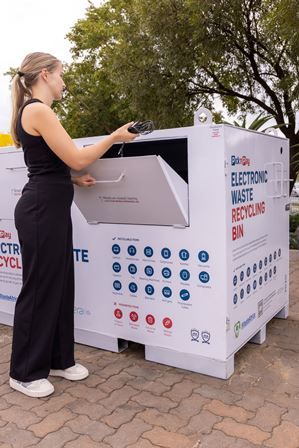
Pick n Pay empowers shoppers in the fight against e-waste, while supporting job creation
Pick n Pay is taking proactive steps to address the escalating global issue of e-waste, the fastest-growing solid waste stream, by introducing 210 e-waste recycling bins in its stores.
So far, 29 bins are located near the entrance or inside of Pick n Pay stores mostly in Gauteng, and KwaZulu-Natal, with more to be rolled out in the Free State, Northern Region and Western Cape stores within the coming months.
The Global E-waste Monitor reported that by 2022 the world had generated 62 billion kg of e-waste, or an average of 7.8 kg per person, and just 22.3 percent of this waste was documented as properly collected and recycled.
In collaboration with EWaste Africa and the E-waste Recycling Authority (ERA), the initiative aims to empower customers to dispose of electronic devices and appliances responsibly, promote sustainable practices, and foster job creation.
Pick n Pay introduced e-waste bins over 15 years ago, but recycled items were typically limited to light bulbs and batteries. “Our existing e-waste bins have been adapted for the growing diversity of e-waste, which changes yearly as technology advances,” says Steffen Burrows, Sustainability Manager at Pick n Pay.
The newly designed bins can accommodate items from cables, kettles and mobile phones to larger appliances like washing machines.
With e-waste outpacing municipal waste growth in South Africa by threefold, proper recycling is critical to preventing environmental harm and health risks outlined by the World Health Organization. E-waste often contains hazardous materials such as lead and lithium, which can pose significant risks if not handled properly. Low recycling rates also mean valuable metals and minerals remain untapped, while landfills approach capacity. Recycling laptops and batteries can conserve resources and reduce environmental impact.
The extended footprint of Pick n Pay's e-waste recycling bins aims to bolster recycling infrastructure.
Pravashen Naidoo, Managing Director of EWaste Africa - the organisation responsible for collecting e-waste from stores for recycling - says that through the Pick n Pay store network, they aim to establish one of the country's largest retail collection networks for consumer e-waste.
“The world's resources are depleting at an exponential rate; these bins will help the momentum towards a circular economy where the waste is re-used,” says Naidoo.
To date, EWaste Africa has recycled over three million kilograms of lighting, solar, battery and electronic waste. “The by-products of the items recycled go into a few secondary sources, such as eco-blocks and paver blocks, which are made from 80% recycled e-waste products.
“This partnership will support the feedstock for the eventual creation of 200 jobs, up from the current 34 jobs within EWaste Africa.”
Ashley Du Plooy, CEO of ERA - a non-profit company and registered Producer Responsibility Organisation spearheading the growth of South Africa’s national electronic waste collection footprint - stressed the importance of public participation, urging South Africans to declutter and drop off their old tech and appliances.
“Through our recent campaigns, it became clear that South Africans are e-waste hoarders. Our partnership with one of the nation's largest retailers will strengthen the infrastructure for improved waste management and responsible citizenry for People, Planet and Purpose,” says Du Plooy.
This growing initiative forms part of Pick n Pay’s commitment to reduce unnecessary waste in the environment through strategic partnerships. “We want to make recycling easier for our customers by providing accessible and easy-to-use recycling solutions in our stores. By doing so, we can positively impact the environment and communities it serves,” concludes Burrows.
News Category
- International retailers
- On the move
- Awards and achievements
- Legislation
- Wine and liquor
- Africa
- Going green
- Supplier news
- Research tools
- Retailer trading results
- Supply chain
- Innovation and technology
- Economic factors
- Crime and security
- Store Openings
- Marketing and Promotions
- Social Responsibility
- Brand Press Office
Related Articles

Pick n pay upcycles air-conditioning systems, s...

Shoprite Group opens pathways to job opportunit...

Massmart implements early leak detection techno...

Woolworths launches Farming for the Future camp...


